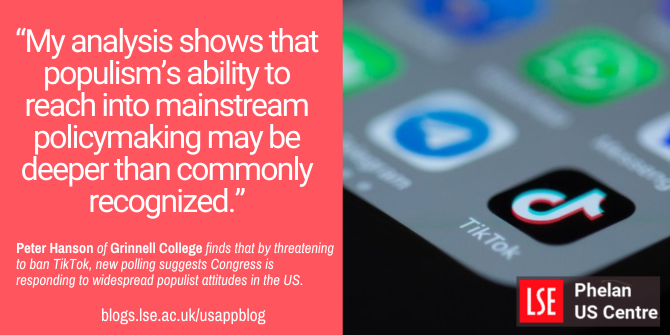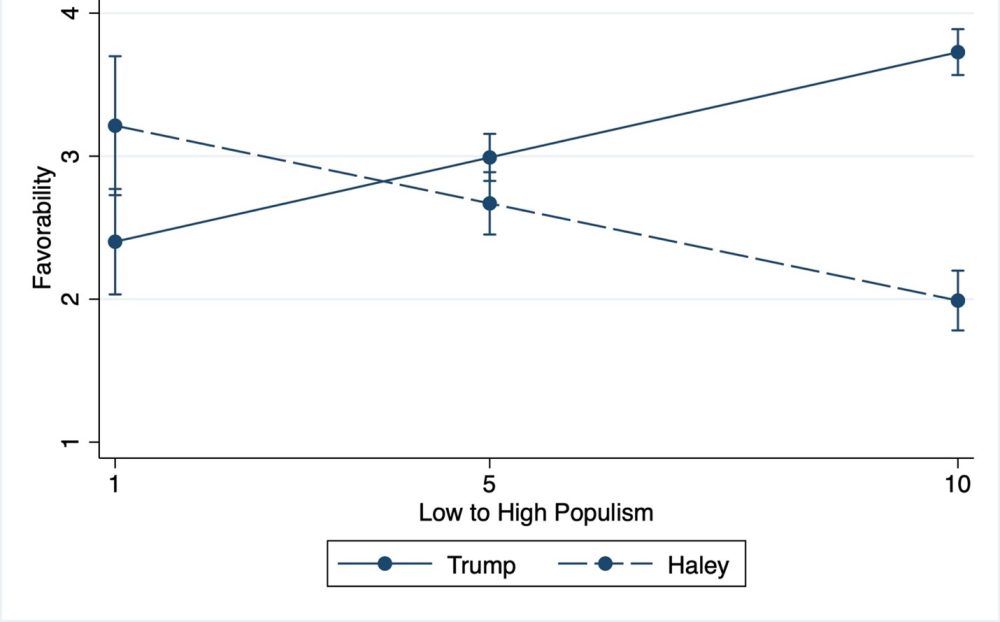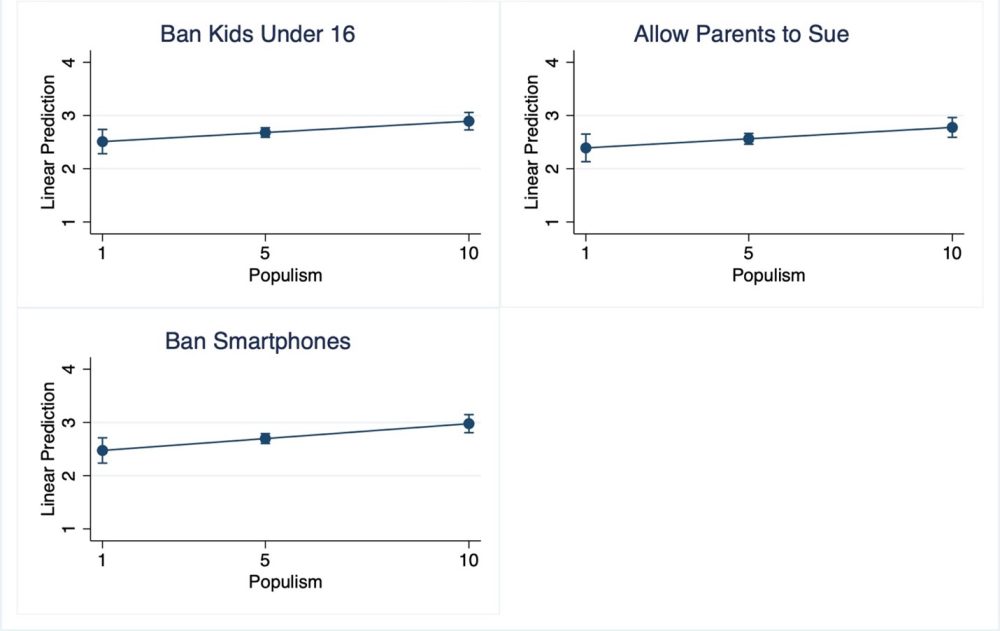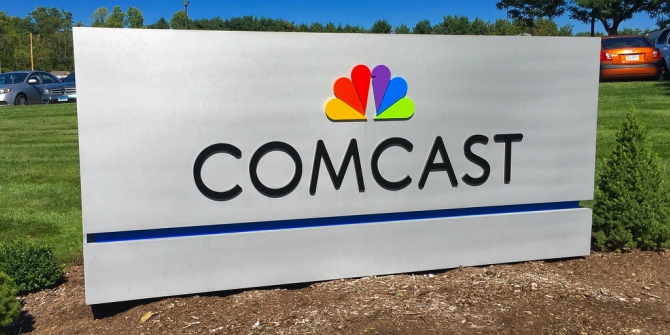 Earlier this month, the US House of Representatives voted to ban TikTok in the US, if its parent company did not sell its stake in the social media network. Peter Hanson looks at recent polling on populism and on the regulation of social media platforms in the US and finds a strong link between those with populist views and support for banning children under 16 from using social media platforms and for banning smartphones in schools.
Earlier this month, the US House of Representatives voted to ban TikTok in the US, if its parent company did not sell its stake in the social media network. Peter Hanson looks at recent polling on populism and on the regulation of social media platforms in the US and finds a strong link between those with populist views and support for banning children under 16 from using social media platforms and for banning smartphones in schools.
On March 13th, the US House of Representatives cast an overwhelming bipartisan vote to ban TikTok, unless the social media company’s parent organization, ByteDance, sold its controlling stake. This is the most significant movement to date at the national level to restrict the power of social media platforms.
It was a surprising moment of agreement during a Congress primarily characterized by bitter partisanship and a lack of productive legislating. It was also notable because congressional Republicans – once small-government conservatives skeptical of corporate regulation – embraced a crackdown on business.
Populism and support for social media regulation
We can look at the political context for this vote with new public opinion data from a recent Grinnell College National Poll. This data shows that there is broad-based support at the mass level for limiting access to social media platforms in the United States and shows the critical connection between populist attitudes and support for regulation.
Populism, as explained by political scientists Pippa Norris and Ronald Inglehart in their book Cultural Backlash, is a political disposition characterized by a distrust of the political establishment and established expertise. It may also be associated with cultural traditionalism and an opposition to new immigration. It is strongly associated with support for Republican presidential candidate Donald Trump in the United States, but also with right-wing insurgent politicians in other liberal democracies.

Photo by Solen Feyissa on Unsplash
This analysis provides evidence that populist attitudes, which are especially concentrated within the Republican rank-and-file, help to explain the willingness of Republican elected officials to challenge the power of big tech companies. As the potential TikTok ban demonstrates, it also suggests that these views could pave the way for legislation in other areas when the populist desire to challenge the establishment, such as by regulating corporations, overlaps with the traditional support of Democrats for such measures.
Populist attitudes in the US
The Grinnell College National Poll is a national telephone survey of just over 1,000 adult US residents fielded by Selzer and Co. on behalf of Grinnell College. The March 2024 edition included questions designed to identify populist attitudes and on regulating social media platforms. The populism measure ranged from 1 to 10, with 10 indicating the highest level of populism. The average populism score for respondents was 6.3, including 5.0 for Democrats, 6.3 for independents, and 7.4 for Republicans.
Statistical tests confirmed that the populism variable functioned as expected. For example, populism has a powerful negative relationship with confidence in voting – populists believe their votes will not be counted as intended. Among Republicans, populism is positively associated with favorable views toward Donald Trump at statistically significant levels. It is negatively associated at statistically significant levels with favorable views toward former South Carolina governor Nikki Haley, Trump’s former challenger for the Republican presidential nomination who attempted to carve out an establishment case for her candidacy (see Figure 1).
Figure 1- Populism and candidate favorability among Republicans

Source: March 2024 Grinnell College National Poll
Regulating social media platforms
The Grinnell poll also tested public support for three policies that would limit the use of social media platforms by children. The results showed majority support including bipartisan support. Banning children under 16 from social media platforms was favored by 55 percent of all respondents, including 58 percent of Republicans and a plurality of 49 percent of Democrats. Allowing parents to sue social media platforms was favored by 52 percent of respondents, including 53 percent of Republicans and 52 percent of Democrats. Banning smartphones in schools was favored by 57 percent of all respondents, including 65 percent of Republicans and 52 percent of Democrats.
Next, I conducted statistical tests to estimate the effects of the populism variable and a standard set of demographic variables on support for each policy. The results provide strong evidence of a correlation between populism and support for the policies. In keeping with the relative lack of variation among demographic groups in the findings overall, few variables are significant in the regression models. Notably, party identification is not significant in any of the models. But populism is positively correlated with support for each policy.
In two of the models, banning kids under 16 from social media platforms and banning smartphones in schools, the populism variable is statistically significant. In one of the models, allowing parents to sue social media platforms, is just shy of statistical significance with a p value of 0.07. The effects are consistent, with coefficients ranging from 0.04 to 0.06. Given that populism is measured on a 10-point scale, this means that moving from the minimum of the scale to the maximum would amount to a shift of between 0.4 to 0.6 points on the 4-point favorability scale for the policies. The magnitude of the shift is illustrated in Figure 2, which shows the marginal effects of moving from the lowest to highest level of populism on support for each policy.
Figure 2 – Marginal Effects of Populism on Support for Regulation

Populism may be more widespread than we think
In the United States, populism is generally associated with radical political views such as election denialism and with rabble-rousers in Congress who are more interested in position-taking than policy. My analysis shows that populism’s ability to reach into mainstream policymaking may be deeper than commonly recognized. Members of the public with more establishment-oriented political views may find themselves making common cause with populists in the pursuit of regulating sectors of the economy such as social media platforms that have come to be viewed as problematic within both camps.
- Please read our comments policy before commenting.
- Note: This article gives the views of the author, and not the position of USAPP – American Politics and Policy, nor the London School of Economics.
- Shortened URL for this post: https://wp.me/p3I2YF-dIs






